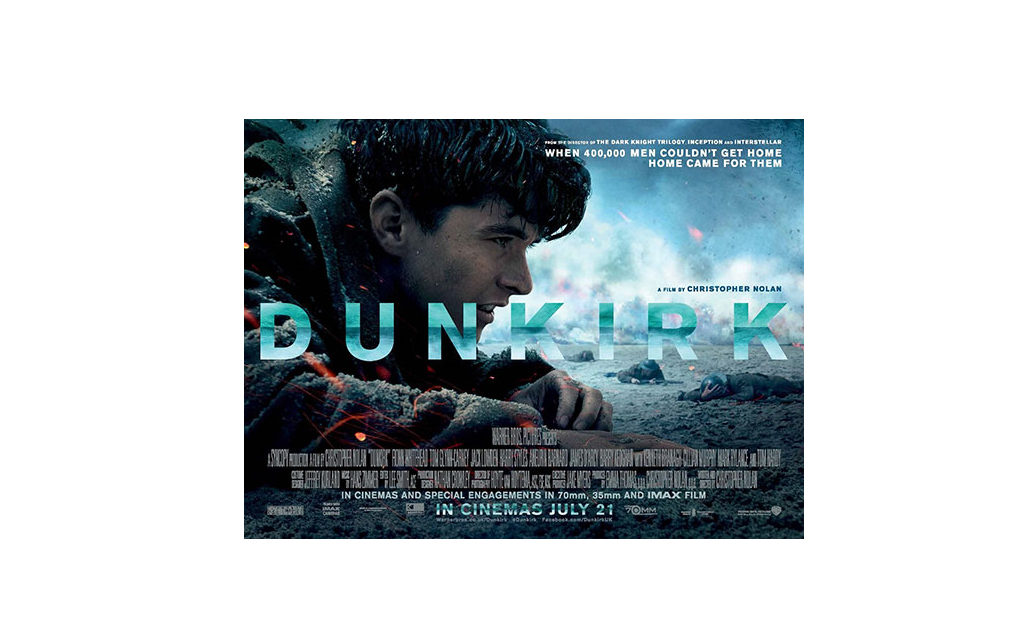by Bob Garver
Entertainment Weekly killed “Dunkirk” for me. Not because the review written by Chris Nashawaty was negative or turned me off in any way, but because it went too far toward the other extreme. On Tuesday afternoon, the headline on EW.com proclaimed the film to be “Easily the Best Movie of the Year So Far.” So I went into the film expecting nothing less than unquestionable excellence, something that would make me forget all about “Logan” and “John Wick: Chapter 2” and all my other favorites of 2017. I should have known that it was never going to pull that off, not with my expectations raised so high. What I got was a fine film whose minor cracks wouldn’t have been so noticeable if I wasn’t expecting perfection.
The film concerns the evacuation of British soldiers from the small town of Dunkirk, France, during World War II. The story unfolds from three perspectives with three different timeframes: the Land portion takes place over a week, Sea over a day, and Air over an hour. As far as I could tell, the only time this gets confusing is when the Sea characters observe the fallout from some Air action that has already taken place and we can tell the movie is having to backtrack. The Land portion follows three British soldiers (Fionn Whitehead, Aneurin Barnard, and a stripped-of-fame Harry Styles) as they try to stay alive as everything around them is getting shot and bombed. The Sea takes us on the small vessel of a civilian (Mark Rylance) as he volunteers for a rescue mission. He picks up a shell-shocked survivor (Cillian Murphy) who compromises his efforts. In the Air, two pilots (Jack Lowden and Tom Hardy) aim to shoot down German planes before they can pick off thousands of soldiers stranded on the beach.
The film makes the curious, yet conscious decision of not letting us get to know any characters very well. This is not a movie where the soldiers have colorful personalities or share pictures of their loved ones. That’s because this isn’t a film about saving a few lives, this is a film about saving thousands of lives. It wants to buck the convention of having us care so much about our heroes that everyone else seems expendable. The unfortunate tradeoff is that the film sacrifices a lot of its humanity and heart treating its characters so impersonally.
The film’s strength is not with its characters or its script, but with its action and its tension. As weary as I am of over-praising the film, it is not an exaggeration to say that it is almost certainly going to win an Oscar for its sound effects. The noise is absolutely brutal, in a way appropriate for a war film. Gunshots, explosions, zooming planes, and various form of crashing water practically provide the soundtrack to the film, that is aside from Hans Zimmer’s pulse-pounding score. There’s little humor to be found in this movie, but one of the few exceptions is that every now and then the score will slow down only to pick up again seconds later when the characters realize there’s no time to rest.
“Dunkirk” is a superior film, for the most part. I did have a hard time accepting its lack of character development and surprisingly short running time (kind of hard to create an environment of utter despair when the film is rushing toward a conclusion one way or another), but I can see where those issues might not bother people. I don’t think EW.com should have declared this the best movie of the year so far in a headline like it’s an objective truth, but I also don’t fault Chris Nashawaty for having that opinion. The film is certainly a welcome break from the comic book movies and other franchise pieces that have dominated the release calendar this year. By all means see it for yourself and decide whether or not it deserves to be called the best.
Two and a Half Stars out of Five.
“Dunkirk” is rated PG-13 for intense war experience and some language. Its running time is 106 minutes.
Contact Bob Garver at rrg251@nyu.edu.




